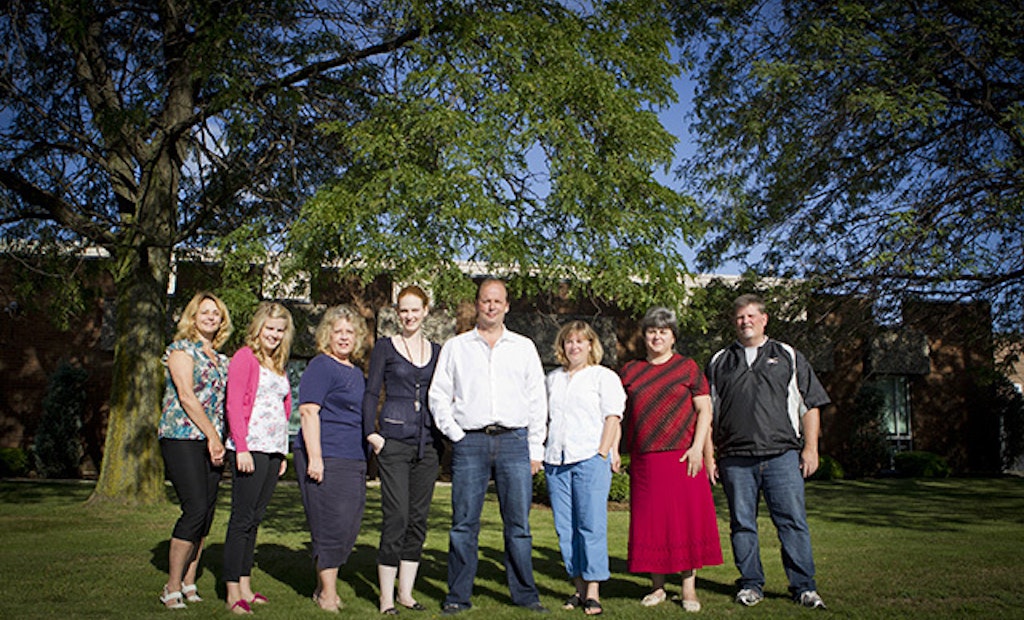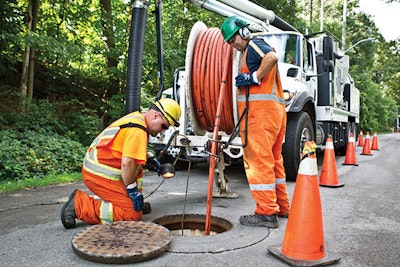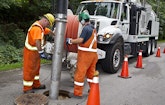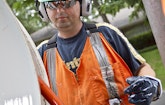
Interested in Inspection?
Get Inspection articles, news and videos right in your inbox! Sign up now.
Inspection + Get AlertsFor Gary Bates, president of Capital Sewer Services Inc. of Hamilton, Ontario, company growth not only drives revenue and market share, it's a survival strategy.
"Larger companies are positioned to take on increasingly large government contracts," he says. "With administration and contract costs approaching 20 percent of business costs, you've got to be big to thrive in the contemporary market."
Bates was launched into the family plumbing business in the early 1980s at age 16 in Mississauga, the city bordering Toronto's western flank. Seeing an opportunity in drain servicing, he launched Capital in 1998, with six employees, including two office staff workers and a couple of trucks.
"We were doing commercial drains and grease traps and worked regular restaurant drain cleaning contracts," says Bates. "We also had a contract with Toronto's downtown Eaton Centre shopping complex, the Air Canada Centre arena and many of the towers in the downtown core."
The business offerings grew rapidly in 2000 with an expansion into municipal drain contracts and closed circuit television (CCTV) inspection.
Entering the CIPP market
"In 2002, our vice president, Brian Ratchford, came on board with a wealth of expertise in cured-in-place technology," he says. "Brian was always ahead of the curve, when very few municipalities were educated enough to request pipe relining."
Capital began to rapidly form itself into teams as business ramped up. That same year, the company expanded to 20 employees divided roughly evenly among commercial, municipal and cured-in-place contracts. The company's vehicle fleet also expanded to 20.
As the need for space grew, Capital moved from Mississauga to Hamilton, about 30 miles southwest, in 2006. With lower operating costs and more land, the company began to build larger facilities.
Today, Capital operates a 30,000-square-foot operations building and a 4,000-square-foot wet-out facility to prepare cured-in-place liners in Hamilton. "There are maybe four wet-out facility locations in all of Canada, and we own one of them," says Bates. "It sharpens our competitive edge to be able to perform this service ourselves."
The facility parking lot provides a home to close to 65 trucks.
"The bulk of our fleet – mostly cube vans – are GMs and Fords," says Bates. "The bigger trucks and 18-wheelers are Volvos, Sterlings, Freightliners, Peterbilts and Internationals."
Capital's 15 combo vacuum trucks are supplied by Vac-Con. Boilers on the steam-curing vehicles are supplied by the Rush Sales Company. The CCTV inspection trucks are outfitted with CUES cameras, including pan-and-tilt models.
Taking care of the fleet
"We employ four full-time fleet staff including a fleet manager, who performs service on all vehicles," says Bates. "We also employ a full-time welder and a millwright. The vehicles are inspected daily, not only for safety but cleanliness. I hate to see a dirty truck. When we work on municipal contracts, city employees have the right to sit inside our CCTV vehicles and the last thing I want is for them to get dirty. They deserve a clean space inside the studio."
With more opportunities opening in western Canada, the company opened a satellite office in Winnipeg, Manitoba, in 2009. The Winnipeg facility includes a 15,000-square-foot operations center, and houses 14 employees and an additional 10 trucks.
Today, the company's contracts are 90 percent municipal, with contracts running longer and trending larger in dollar value.
"In the 1990s, we were getting sewer contracts in the $50,000 to $600,000 range," says Bates. "Today, they're coming in at $5 to $15 million. These are also longer-term contracts lasting two to three years instead of a single year. That's good for contractors, because if you're going to buy more than $2 million worth of trucks to service a contract, you want to know you'll be keeping them occupied for a while."
A current $5 million contract with the City of Toronto involves CCTV inspection and assessment of more than 300 miles of city sewer lines and 9,500 manholes. Capital works with Genivar, an engineering firm in Montreal, Quebec, to handle all of the data assessment for the project.
Capital is also taking on a $9 million contract spanning three years for the nearby Region of Peel.
Working with municipal government
"The larger contracts require a bit more patience, learning the diplomacy of dealing with the municipal structure and working with the consulting firms they hire," says Bates.
Municipalities are also very specific in their requirements for software compatibility, particularly in the way CCTV inspections are recorded and reported.
"We must have over a quarter-million dollars worth of recording and reporting software, because every city wants something different," says Bates.
In 2004, the company aligned itself with National Liner LLC, then known as National Envirotech Group, becoming the first Canadian certified installer and service provider of National Liner cured-in-place materials. The alliance gives it access to the Complete Lateral System's flexible, no-dig pipe rehabilitation technology and the National Liner CIPP system, offering nonwoven polyester felt relining on sewer lines ranging from 6 to 120 inches in diameter.
"It's an alliance of five companies that not only benefit from bulk purchasing and access to installation equipment, but also from sharing expertise," says Bates. "Each of us works on different types of projects and tries new techniques under a range of climates from California, Texas and Florida to Milwaukee and all of Canada. If we try a new product, we can review it and add it to the supply list if it works out."
Because of delivery logistics, it's still to Capital's advantage to have resins delivered by AOC Canada in Guelph, Ontario, about a half-hour's drive north of the city.
For culverts and large pipes, Capital offers National Liner's 3S Segment Panel System, a series of molded, translucent PVC panels, which assemble to form a new lining on circular pipe 40 to 160 inches in diameter and culverts from 40-by-40 to 200-by-200 inches in diameter. It also offers the Channeline GRP system, which employs a structural liner composed of a center core, which consists of silica sand and resin matrix and an outer glass mat/resin layer, which is coated with aggregate.
A switch to green resins
The latest trend in pipe rehabilitation is the use of green resins and other chemicals that are less harmful to the environment. Capital now only uses green resin.
"We are moving to make our lineup styrene-free and removing all petroleum from our products," says Bates. "In the cities of London and Toronto,
Ontario, for example, all contracts specify that resins must be styrene-free for storm pipes. The switch to greener chemicals may fly in the face of a market that wants to see products and services offered cheaper and faster, but it will happen. In the meantime, we're absorbing some of the cost of this evolution."
Capital Sewer Services continues to operate at full capacity with a healthy slate of municipal contracts in front of it.
"Our strength continues to be the municipal market and we've achieved the critical mass where we can consistently remain competitive in that market," says Bates. "If the pundits are right, and smaller contractors are slowly driven out of the business by the requirements of managing large contracts, we'll still be here to take those contracts on."













